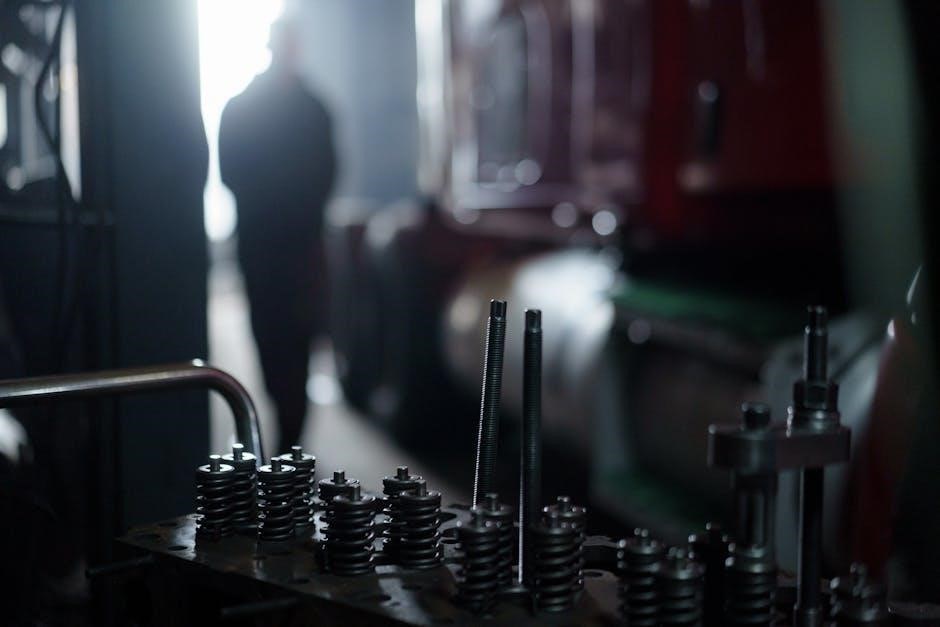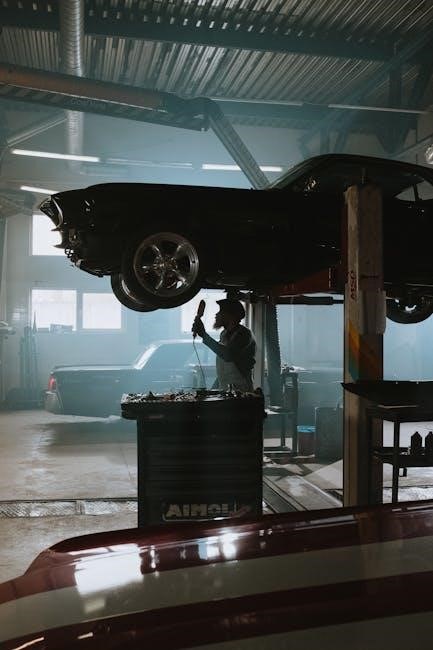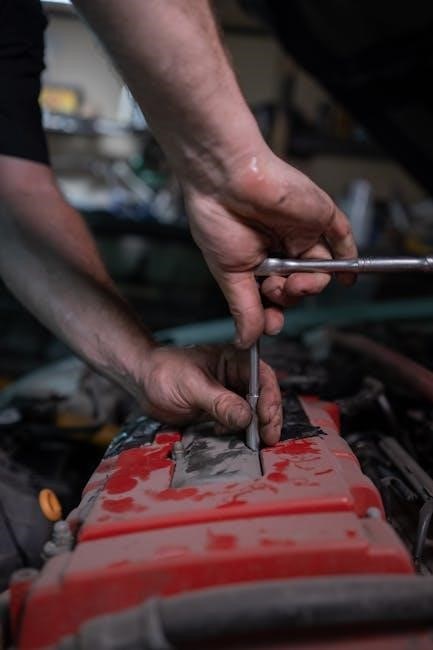Automotive workshop tools are essential for efficient vehicle maintenance and repairs. A comprehensive tool list PDF ensures you have everything needed, from basic hand tools to advanced diagnostic equipment, helping you tackle any job with confidence and precision.
Overview of Essential Tools for Automotive Repairs
Essential automotive tools form the backbone of any successful repair job. They include basic hand tools like wrenches, sockets, screwdrivers, and pliers, which are indispensable for loosening, tightening, and gripping components. Power tools such as impact wrenches and drills enhance efficiency, while diagnostic equipment like multimeters and OBD-II scanners help identify issues. Specialized tools, such as brake bleeding kits and suspension tools, are tailored for specific tasks. A well-organized tool list PDF categorizes these tools, ensuring easy access and helping mechanics and DIYers prepare for a wide range of automotive challenges. Having the right tools ensures precision, safety, and professionalism in every repair.
Importance of Having a Comprehensive Tool List
A comprehensive tool list is crucial for ensuring efficiency and preparedness in automotive repairs. It helps mechanics and DIYers identify essential tools, preventing delays and ensuring safety. By organizing tools into categories, a detailed tool list PDF streamlines workflows and reduces downtime. It also serves as a reference for future upgrades, allowing you to anticipate needs and budget accordingly. A well-curated list promotes accountability, helping you track tool condition and location. This organization fosters professionalism and confidence, enabling you to tackle repairs with precision and efficiency. Ultimately, a comprehensive tool list is the foundation of a productive and well-equipped workshop.
How to Build the Ultimate Garage for DIY Car Maintenance
Building the ultimate garage for DIY car maintenance starts with a well-planned layout and essential tools. Begin by investing in a modular workbench and a tool cabinet or rollaway cart to keep tools organized. Ensure proper lighting and ventilation for a safe working environment. Install pegboards or slat walls for easy tool access. Incorporate a vice and jack stands for vehicle lifting. Store frequently used tools in labeled containers for quick retrieval. Consider adding a parts washer and a dedicated area for diagnostic equipment like a multimeter or OBD-II scanner. Finally, include a fire extinguisher and first aid kit for safety. A well-equipped garage enhances efficiency and makes DIY maintenance enjoyable and stress-free.

Hand Tools for Automotive Workshops
Hand tools are the backbone of any automotive workshop, including wrenches, sockets, screwdrivers, and pliers. They are essential for basic repairs and maintenance tasks, ensuring versatility and reliability.
Wrenches and Sockets
Wrenches and sockets are indispensable in automotive workshops, offering versatility for various tasks. Combination wrenches, adjustable wrenches, and open-end wrenches are essentials for loosening and tightening bolts and nuts. Socket sets, including 3/8″, 1/2″, and 1″ drives, provide adaptability for different bolt sizes. Extensions and universal joints enhance reach and flexibility, making them ideal for accessing hard-to-reach areas. These tools are fundamental for efficient repairs and maintenance, ensuring precision and reliability in daily operations. A well-organized set of wrenches and sockets is a cornerstone of any professional or DIY toolkit, catering to both basic and complex tasks.
Screwdrivers and Pliers
Screwdrivers and pliers are fundamental hand tools in any automotive workshop. Screwdrivers, available in flathead and Phillips types, are essential for driving screws and other fasteners. Pliers, including slip-joint, needle-nose, and locking varieties, provide a secure grip on objects, making them ideal for bending, twisting, or holding parts in place. Ergonomic handles and durable materials ensure comfort and longevity. These tools are indispensable for tasks ranging from basic repairs to complex overhauls, offering precision and reliability. Including them in your toolkit ensures you’re prepared for a wide range of automotive maintenance and repair scenarios.
Measuring Tools for Precision
Measuring tools are crucial for achieving accuracy in automotive repairs. Calipers, micrometers, and depth gauges ensure precise measurements of components like engine parts and bearings. Torque wrenches guarantee proper bolt tightening, preventing damage from over- or under-tightening. Tire pressure gauges and alignment tools help maintain vehicle safety and performance. These tools are essential for diagnosing issues and ensuring repairs meet manufacturer specifications. Including them in your toolkit enhances the quality of your work, making them indispensable for both professionals and DIY enthusiasts aiming for precise and reliable results in every project.
Cutting and Boring Tools
Cutting and boring tools are vital for modifying or fabricating automotive components. Hacksaws and reciprocating saws are used for cutting metal pipes, bolts, and sheet metal. Drill presses and boring bars enable precise hole drilling and enlarging, essential for engine overhauls and custom modifications. Files and deburring tools smooth rough edges, ensuring safe and professional finishes. These tools are indispensable for tasks requiring material removal or reshaping, making them a must-have in any automotive workshop. Including them in your toolkit ensures you can handle fabrication and repair jobs efficiently and effectively.

Power Tools for Advanced Repairs
Power tools like impact wrenches, air compressors, and drill presses are crucial for advanced automotive repairs. They provide the precision and force needed for complex tasks efficiently and safely.
Impact Wrenches and Air Compressors
Impact wrenches and air compressors are indispensable for heavy-duty automotive tasks. Impact wrenches deliver high torque for loosening stubborn bolts and nuts, while air compressors power pneumatic tools, spray paint, and inflate tires. They are essential for efficiency in professional and home garages, ensuring faster and safer repairs. When selecting, consider air pressure requirements and the type of tasks they will handle. Including these in your automotive workshop tools list PDF ensures you’re prepared for demanding jobs, making them a must-have for any serious mechanic or DIY enthusiast.
Drill Press and Grinding Tools
Drill presses and grinding tools are essential for precision tasks in automotive workshops. Drill presses allow for accurate drilling of holes, while grinding tools are used to smooth and polish metal surfaces. These tools are crucial for repairing engine components, fabricating custom parts, and preparing surfaces for welding. When selecting, consider variables like power, speed, and compatibility with various materials. Including these in your automotive workshop tools list PDF ensures versatility and capability for advanced repairs. Proper maintenance and safe operation are key to extending their lifespan and ensuring optimal performance in your garage or professional setting.
Electric and Pneumatic Tool Sets
Electric and pneumatic tool sets are indispensable for advanced automotive repairs, offering efficiency and versatility. These tools, including impact wrenches, drills, grinders, and sanders, are powered by electricity or compressed air, enabling high-torque tasks with minimal effort. Pneumatic tools, paired with an air compressor, are ideal for heavy-duty applications, while electric tools provide precision and portability. Variable speed settings and interchangeable attachments make them adaptable for various materials and tasks. Including these in your automotive workshop tools list PDF ensures you’re equipped for demanding jobs, reducing fatigue and improving accuracy in your workshop.

Diagnostic Equipment
Diagnostic equipment is crucial for identifying vehicle issues efficiently. Essential tools include multimeters for electrical systems, OBD-II scanners for modern vehicles, and air pressure gauges for tire and system checks.
Multimeters for Electrical Diagnostics
A multimeter is a fundamental tool for diagnosing electrical issues in vehicles. It measures voltage, current, and resistance, helping identify faults in circuits, batteries, and wiring systems. With its high accuracy and versatility, a multimeter is essential for troubleshooting everything from faulty sensors to malfunctioning alternators. Modern multimeters often include additional features like temperature measurement and data logging. Whether you’re a professional mechanic or a DIY enthusiast, a reliable multimeter is indispensable for ensuring electrical systems operate safely and efficiently. It’s a must-have in every automotive toolkit for precise and effective diagnostics.
OBD-II Scanners for Modern Vehicles
OBD-II scanners are indispensable for diagnosing modern vehicles equipped with onboard diagnostics systems. These tools connect to a car’s computer, providing detailed insights into engine performance, emissions, and trouble codes. By reading fault codes, technicians can quickly identify issues, streamline repairs, and ensure compliance with emissions standards. Advanced OBD-II scanners often include features like real-time data monitoring, freeze-frame analysis, and compatibility with multiple vehicle brands. Whether you’re a professional mechanic or a DIY enthusiast, an OBD-II scanner is a must-have for efficient and accurate troubleshooting. It simplifies complex diagnostics, saving time and reducing guesswork in modern automotive maintenance.
Air Pressure Gauges and Testing Kits
Air pressure gauges and testing kits are essential for ensuring proper tire pressure, brake systems, and suspension functionality. These tools help maintain vehicle safety and performance by accurately measuring pressure levels. Digital and analog gauges are available, offering precise readings for various applications. Testing kits often include adapters for different valve types, making them versatile for cars, trucks, and motorcycles. Regular use of these tools promotes optimal vehicle handling, fuel efficiency, and reduces wear on components. They are a must-have for both professional mechanics and DIY enthusiasts, ensuring accurate and reliable pressure measurements in automotive maintenance and repairs.

Specialized Tools for Specific Tasks
Specialized tools are designed for specific automotive tasks, ensuring precision and efficiency. Essential for complex repairs, they include brake bleeding kits, suspension tools, and engine overhaul sets.

Brake Bleeding Kits
A brake bleeding kit is an essential tool for maintaining and repairing brake systems. It ensures the removal of air from brake lines, guaranteeing proper hydraulic pressure and safe vehicle operation. These kits typically include adapters, hoses, and fluid containers, making the process efficient and precise. Regular use of a brake bleeding kit prevents spongy brake pedals and maintains consistent stopping performance. Whether for DIY enthusiasts or professional mechanics, this tool is vital for ensuring brake system reliability and overall vehicle safety. Incorporating a brake bleeding kit into your workshop toolkit is a must for any comprehensive automotive maintenance routine;
Suspension and Steering Tools
Suspension and steering tools are specialized equipment designed for precise adjustments and repairs of a vehicle’s suspension and steering systems. These tools include ball joint separators, coil spring compressors, and steering wheel pullers, enabling safe and efficient disassembly and reassembly of components. They are essential for tasks like replacing tie rods, stabilizer links, and control arms. Proper use of these tools ensures accurate alignment and maintains vehicle stability and handling. Including these in your toolkit is crucial for diagnosing and correcting issues in the suspension and steering systems, ensuring optimal performance and safety on the road. Regular maintenance with these tools prevents premature wear and improves overall vehicle reliability.
Engine Repair and Overhaul Tools
Engine repair and overhaul tools are essential for performing major engine work, such as disassembly, inspection, and reassembly. These specialized tools include piston ring compressors, engine hoists, and dial indicators for precise measurements. A crankshaft locking tool ensures proper timing alignment, while a valve spring compressor facilitates safe removal and installation of valves. These tools are designed to handle the complexity of engine repairs, enabling technicians to work efficiently and accurately. Including these in your toolkit is vital for diagnosing and addressing internal engine issues, ensuring optimal performance and longevity. Regular use of these tools requires proper training to avoid damage to critical components.

Tool Storage and Organization
Proper tool storage and organization are crucial for efficiency and safety in any workshop. Modular work benches, tool cabinets, and rollaway carts provide ample space for organizing tools. Labeling and categorizing tools ensure quick access, reducing downtime during repairs. A well-organized workspace enhances productivity and helps maintain tool condition, preventing damage or misplacement. Investing in quality storage solutions is essential for both professional and home garages, fostering a tidy and functional environment for automotive repairs and maintenance.
Modular Work Benches
Modular work benches are a versatile and essential component of any automotive workshop. They provide a sturdy, customizable workspace for tools and projects, ensuring efficiency and organization. These benches often feature adjustable heights, built-in storage compartments, and durable surfaces designed to withstand heavy use. Modular designs allow for easy expansion or reconfiguration to meet specific needs, making them ideal for both professional and home garages. Their versatility enables seamless integration with other storage solutions, creating a tidy and functional workspace. Investing in a high-quality modular work bench is a smart decision for any mechanic or DIY enthusiast looking to enhance productivity and tool organization.
Tool Cabinets and Rollaway Carts
Tool cabinets and rollaway carts are indispensable for organizing and storing automotive tools. They provide secure, dust-free storage and feature adjustable compartments to keep tools tidy. Rollaway carts offer mobility, allowing easy access to tools around the workshop. High-quality cabinets and carts are made from durable materials, ensuring long-term reliability. They often include locking mechanisms for added security. Having a dedicated storage system prevents tool loss and damage, while also enhancing workshop efficiency. Investing in a sturdy tool cabinet or rollaway cart is crucial for maintaining a professional and organized workspace, making it easier to locate tools when needed.
Labeling and Categorizing Tools
Labeling and categorizing tools is essential for maintaining a well-organized workshop. Clear labels on tool cabinets and rollaway carts ensure quick identification, saving time during repairs. Tools should be grouped by function, such as wrenches, screwdrivers, and diagnostic equipment, to enhance accessibility. Color-coding systems can further distinguish tool categories, reducing confusion. A detailed tool list PDF can serve as a reference, ensuring all items are accounted for and properly stored. Regular updates to labels and categories are crucial as new tools are added. This structured approach prevents tool loss, streamlines workflows, and maximizes workshop efficiency for both professionals and DIY enthusiasts.

Safety Equipment in the Workshop
Safety equipment is crucial for protecting yourself and others in the workshop. Essential items include gloves, goggles, fire extinguishers, and first aid kits. Proper use of protective gear ensures a safer working environment and prevents accidents during repairs and maintenance;
Essential Safety Gear
Essential safety gear for an automotive workshop includes gloves, safety goggles, fire extinguishers, and first aid kits. These items protect against hazards like sharp tools, chemical spills, and electrical risks. Proper protective equipment ensures hands and eyes are safeguarded during repairs. Fire extinguishers and first aid kits are critical for emergency response. Regular inspections of safety gear ensure they are in good condition. Proper training on equipment use further enhances workshop safety. A well-prepared environment minimizes risks and promotes a culture of safety, allowing mechanics to focus on their work with confidence.
Fire Safety and Emergency Equipment
Fire safety and emergency equipment are crucial in automotive workshops to prevent and manage potential hazards. Essential items include fire extinguishers rated for chemical, electrical, and grease fires, smoke detectors, and emergency exit signs. Fire blankets and spill kits are also vital for containing small fires and chemical leaks. Regular inspections of these tools ensure they are functional and easily accessible. Proper training on their use is essential to respond effectively during emergencies. Maintaining a well-stocked emergency kit, including first aid supplies, further enhances workshop safety. These measures protect both people and property, ensuring a secure environment for all repair activities.
Proper Use of Protective Gear
Protective gear is essential in automotive workshops to safeguard against injuries. Safety glasses or goggles protect eyes from debris, while gloves prevent cuts and abrasions. Steel-toe boots ensure foot protection from heavy tools or falling objects. Hearing protection, like earplugs, is necessary when using loud equipment. Face masks prevent inhalation of harmful fumes or dust. Proper use of these items requires adherence to safety guidelines and regular inspections for wear and tear. Neglecting protective gear can lead to serious accidents, emphasizing the importance of prioritizing safety in every task. Regular training on correct usage ensures a safer working environment for all technicians and DIY enthusiasts.

Maintenance and Care of Tools
Regular cleaning, lubrication, and proper storage of tools are essential to maintain their functionality and extend lifespan. This ensures tools remain in optimal condition for efficient repairs and maintenance.
Cleaning and Lubricating Tools
Regular cleaning and lubrication are crucial for maintaining tool performance and longevity. Use solvents to remove grease and grime, and dry tools thoroughly to prevent rust. Apply lubricants to moving parts to reduce friction and wear. Store tools in a dry, clean environment to protect them from corrosion. Proper maintenance ensures tools remain in optimal condition, ready for efficient repairs and consistent performance. Regular inspection and timely cleaning can prevent damage and extend the lifespan of your automotive workshop tools. This practice is essential for both hand and power tools, ensuring reliability and precision in every task.
Regular Inspection of Tool Condition
Regular inspection of tool condition is vital to ensure reliability and safety in automotive repairs. Check for signs of wear, rust, or damage that could affect performance. Look for loose handles, worn jaws on pliers, or blunt edges on cutting tools. Inspect power tools for frayed cords or malfunctioning motors. Replace or repair damaged tools promptly to avoid accidents and maintain precision. A well-maintained set of tools enhances efficiency and ensures consistent results. Schedule routine inspections to identify issues early and prevent costly replacements. This practice extends tool lifespan and supports professional-grade repairs in any workshop environment.
Storage Tips to Prevent Damage
Proper storage is crucial to protect automotive tools from damage and extend their lifespan. Use high-quality tool cabinets or rollaway carts with organized drawers to keep tools tidy and accessible. For wall-mounted tools, install pegboards with hooks and bins for small items. Clean tools thoroughly before storage to prevent rust or corrosion. Apply a light layer of lubricant to metal surfaces for added protection. Store tools in a dry, temperature-stable environment, avoiding extreme heat or humidity. Consider silica gel packets to absorb moisture in storage areas. Label each storage space clearly to ensure tools are returned to their correct spots. Regularly inspect stored tools for signs of wear or damage. This organized approach prevents misplacement, reduces clutter, and ensures tools remain in optimal condition for future use.

Creating a Tool List PDF
A well-organized tool list PDF streamlines your workshop setup, ensuring all essential tools are accounted for and easily accessible. It helps track inventory, plan projects, and maintain efficiency.
Steps to Compile a Comprehensive List
Compiling a detailed automotive workshop tools list PDF involves identifying essential tools, categorizing them by function, and noting quantities. Start with basic hand tools like wrenches and screwdrivers, then move to power tools and diagnostic equipment. Prioritize must-have items for common repairs and include optional tools for specialized tasks. Use a template or spreadsheet for clarity, and add visuals or descriptions for easy reference. Regularly update the list as tools are added or replaced. This organized approach ensures your workshop stays efficient and well-prepared for any automotive project.
Organizing Tools by Category
Organizing tools by category in your automotive workshop tools list PDF enhances efficiency and accessibility. Start by grouping tools into broad categories such as Hand Tools, Power Tools, Diagnostic Equipment, and Specialized Tools. Within these groups, further classify tools by function, such as wrenches, screwdrivers, or air compressors. Use clear labels and descriptions to ensure easy identification. This structured approach reduces search time, prevents misplacement, and ensures every tool is accounted for. A well-organized list also helps in identifying gaps in your toolkit, allowing you to make informed purchasing decisions. This method is essential for both professional and DIY workshops, promoting a safer and more productive environment.
Updating the List for New Tools
Regularly updating your automotive workshop tools list PDF ensures it remains relevant and comprehensive. Whenever new tools are acquired, such as advanced diagnostic equipment or specialized wrenches, they should be immediately added to the list. Categorize each tool under appropriate sections like Hand Tools, Power Tools, or Diagnostic Equipment. Use bullet points or checkboxes to mark tools you own versus those you need to purchase. Include details like brand, model, and size for clarity. This practice helps maintain organization, prevents duplication, and ensures your toolkit evolves with your needs. Regular updates also highlight gaps, helping you prioritize future purchases and keep your workshop efficient and safe.
Having a well-organized automotive workshop tools list PDF is crucial for efficient repairs and maintenance. Regular updates ensure your toolkit stays relevant, helping you tackle any job with confidence and precision.
Final Thoughts on Building Your Tool Set
Building a comprehensive automotive workshop tool set is a lifelong journey that enhances efficiency and confidence in vehicle maintenance; Start with essentials like wrenches, sockets, and screwdrivers, then gradually add specialized tools as your skills evolve. A well-organized tool list PDF serves as a roadmap, ensuring you never miss critical items. Regularly update your toolkit to adapt to new technologies and repair techniques. Remember, quality tools are an investment in your craft, providing long-term reliability and precision. Download your automotive workshop tools list PDF today and create a structured, efficient workspace tailored to your needs.
Future-Proofing Your Workshop
Future-proofing your workshop involves investing in versatile tools and staying updated with industry advancements. Focus on acquiring tools that adapt to emerging technologies, such as electric vehicles and advanced diagnostics. Regularly update your automotive workshop tools list PDF to reflect new requirements and innovations. Modular workbenches and scalable storage solutions ensure flexibility as your needs grow. Prioritize quality over quantity, as durable tools withstand long-term use. Stay informed about trends like hybrid and electric vehicle repair to maintain relevance. By continuously evolving your toolkit, you ensure your workshop remains efficient and capable of handling future challenges in automotive maintenance and repair.
Encouragement for Continuous Learning
Continuous learning is crucial for mastering automotive workshop tools and staying updated with industry advancements. The automotive industry evolves rapidly, with new technologies like electric vehicles and advanced diagnostic systems emerging regularly. Encourage yourself to explore workshops, online courses, and manuals to enhance your skills. Stay curious about innovative tools and techniques, as they can significantly improve your efficiency and accuracy. By embracing lifelong learning, you adapt to changes, expand your expertise, and remain competitive in the field. Dedicate time to practice and explore new tools from your automotive workshop tools list PDF to ensure you’re always prepared for the next challenge.
